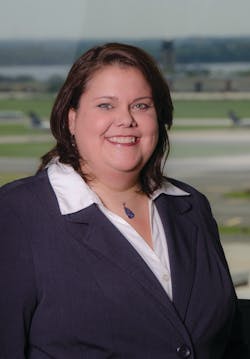Renee Tufts
Airport Security Manager
Philadelphia International Airport
Date of Birth: 3-6-1975
Years in Aviation: 13
Aviation became a bug Renee Tufts says she “needed a fix for” after a friend of her father’s took her and her sister on a quick introductory flight over their home in northern Wisconsin. Following a family trip to Colorado and a brief glimpse of the Thunderbirds soaring over the U.S. Air Force Academy, the “interest in aviation” became a life goal. To achieve this goal, Tufts studied at the University of North Dakota to earn a degree in Airport Management and her private pilot’s license.
Today she has been in the field she loves for more than 13 years, and has been the security manager at Philadelphia International Airport (PHL) for the past eight years. She started her aviation career at PHL as an airport administrative trainee in the Security Department in 2000. Over the next five years, she rose through the ranks to become the security manager of one of the busiest international airports in the United States.
As PHL’s security manager and primary airport security coordinator, Tufts is responsible for the development, enforcement and continued maintenance of the Airport Security Program (ASP) document. She is a member of the Public Safety & Security committee for Airports Council International–North America, and the Transportation Security Services committee for the American Association of Airport Executives.
Tufts’ active role in all aspects of airport security and her relationships with the tenants and federal partners assists PHL in creating mitigation strategies that address identified vulnerabilities. These relationships with the airport community help Tufts constantly improve PHL’s security efforts and help find innovative ways to keep operations safe and secure.
She considers the development and deployment of PHL’s unmanned exit lane system her greatest achievement. “My superiors let me try a layered technology approach and it worked, and now other airports are now coming and looking at it,” she says. “Normally at an airport of this size, it’s easier to build off of something that’s been done successfully somewhere else and improve on their lessons learned. This time our security department is a leader in this technology development.”

